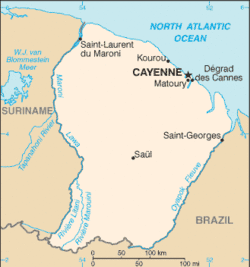Guianan Creole
| Guianan Creole | |
|---|---|
| Kréyòl Gwiyanè | |
| Native to | Guiana |
Native speakers | 150,000–200,000 (2016) |
|
French Creole
| |
| Language codes | |
| ISO 639-3 |
gcr |
| Glottolog |
guia1246[1] |
| Linguasphere |
51-AAC-cda to -cdd) |
| Guianan Creole test of Wikipedia at Wikimedia Incubator |

 |
Interview
Interview of Marie-Annick Atticot at the États généraux du multilinguisme dans les outre-mer (december 2011). |
| Problems playing this file? See media help. | |
French Guianan Creole or Guianan Creole is a French-based creole language spoken in French Guiana, and to a lesser degree, in Suriname and Guyana. It resembles Antillean Creole, but there are some lexical and grammatical differences between them. Antilleans can generally understand French Guianan Creole, though the notable differences between the French creole of French Guiana and those of the rest of the Atlantic may cause some instances of confusion. The differences consist of more French and Brazilian Portuguese influences (due to the proximity of Brazil and Portuguese presence in the country for several years.) There are also words of Amerindian and African origin. There are Guianan communities in Suriname and Guyana who continue to speak Guianan Creole.
It should not be confused with the Guyanese Creole language, based on English, spoken in nearby Guyana.
History
Guianan Creole was a language spoken between slaves and settlers. But the conditions of Guianan Creole's constitution were quite different from the Creole of the West Indies, on the one hand because of the conflicts between French, English, Dutch, Portuguese and Spanish, and French dialects such as the Caen Have greatly influenced Guianan Creole, which has made it significantly different from the Creoles of Martinique, Haiti, St. Lucia and Guadeloupe.
There are, therefore, in Guianan Creole a few words in common with the Creoles of the West Indies, however, a number of words differentiate them significantly.
In addition, the Guianan pronounce the letter 'r' . Whereas in the West Indies the pronunciation of 'r' 'tends rather to approximate the semi-vowel ' w '.
| Vocabulary | Pronunciation in French | In Guianan Creole | Pronunciation in English |
|---|---|---|---|
| Riz | Ri | Douri | Rice |
| Dormir | Dormir | Dronmi | Sleep |
Personal pronouns are placed before the name:
| In French | Ma maison | Leurs enfants | Sa femme |
|---|---|---|---|
| In Guianan Creole | Mo kaz | Yo timoun | So fanm/So madanm |
| In English | My house | Their children | His wife |
Orthography and phonology
Guianan Creole is largely written using the French alphabet, with only a few exceptions. 'Q' and 'X' are replaced by 'k' and 'z' respectively. 'C' is not used apart from in the diagraph, ch, where it stands for [ʃ] (the word for horse is chouval, similar to French's cheval.) Otherwise, it is replaced by 'k' when it stands for [k] (Standard French's comment (why) is written kouman) and 's', when it stands for [s]. Silent 'h' is never written, unlike in Standard French, where it remains for etymological purposes.
Examples
| Guianan Creole (IPA) | Metropolitan French | English |
|---|---|---|
| Bonswè /bonswɛ/ | Bonsoir | Good evening |
| Souplé /suː plɛ/ | S'il vous plaît | Please |
| Mèsi /mɛsi/ | Merci | Thank you |
| Mo /mɔ/ | Moi, me, je | Me, I |
| To /tɔ/ | Toi, te, tu | You |
| Li /li/ | Lui, le, la | Him, her |
| Roun /ruːn/ | Un, une | One |
| Eskizé mo /esˈkizɛ mɔ/ | Excusez-moi | Excuse me, pardon me |
| Lapli ka tonbé /laˈpliː ka tombɛ/ | Il pleut | It's raining |
| Jod-la a roun bèl jou /ʒodˈla a ruːn bel ʒu/ | Aujourd'hui, il fait beau | Today is a beautiful day |
| A kouman to fika? /a kumã to fika/ | (Comment) ça va? | How are you? |
| Ann a mo manman /an a mɔ ˈmãmã/ | Anne est ma mère | Anne is my mother |
| Andy a to frè /andi a tɔ frɛ/ | Andy est ton frère | Andy is your brother |
| I ka alé laplaj /i kaːlɛ laˈplaʒ/ | Il va à la plage | He's going to the beach |
| Mo pa mélé /mɔ pa mɛlɛ/ | Je m'en moque | I don't care |
References
- ↑ Hammarström, Harald; Forkel, Robert; Haspelmath, Martin; Bank, Sebastian, eds. (2016). "Guianan Creole French". Glottolog 2.7. Jena: Max Planck Institute for the Science of Human History.